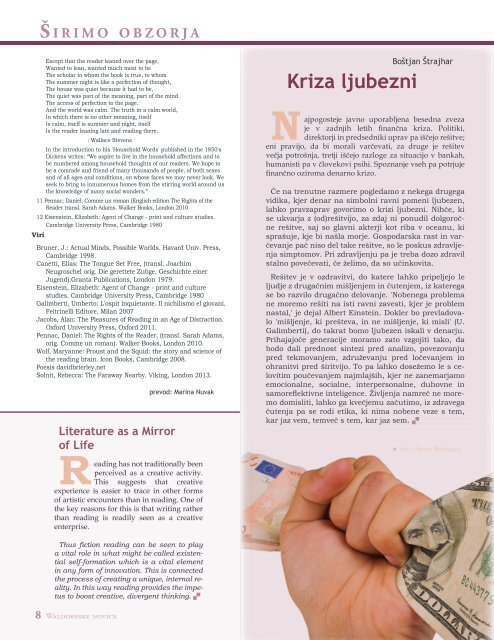Waldorfske novice - Zima 2014
Letnik X, številka 4 Časopis Waldorfske šole Ljubljana
Letnik X, številka 4
Časopis Waldorfske šole Ljubljana
You also want an ePaper? Increase the reach of your titles
YUMPU automatically turns print PDFs into web optimized ePapers that Google loves.
Š i r i m o o b z o r j a<br />
Except that the reader leaned over the page,<br />
Wanted to lean, wanted much most to be<br />
The scholar to whom the book is true, to whom<br />
The summer night is like a perfection of thought,<br />
The house was quiet because it had to be,<br />
The quiet was part of the meaning, part of the mind<br />
The access of perfection to the page.<br />
And the world was calm. The truth in a calm world,<br />
In which there is no other meaning, itself<br />
Is calm, itself is summer and night, itself<br />
Is the reader leaning late and reading there.<br />
: Wallace Stevens<br />
In the introduction to his 'Household Words' published in the 1850's<br />
Dickens writes: “We aspire to live in the household affections and to<br />
be numbered among household thoughts of our readers. We hope to<br />
be a comrade and friend of many thousands of people, of both sexes<br />
and of all ages and conditions, on whose faces we may never look. We<br />
seek to bring to innumerous homes from the stirring world around us<br />
the knowledge of many social wonders.”<br />
11 Pennac; Daniel: Comme un roman (English edition The Rights of the<br />
Reader transl. Sarah Adams. Walker Books, London 2010<br />
12 Eisenstein, Elizabeth: Agent of Change - print and culture studies.<br />
Cambridge University Press, Cambridge 1980<br />
Viri<br />
Bruner, J.: Actual Minds, Possible Worlds. Havard Univ. Press,<br />
Cambridge 1998.<br />
Canetti, Elias: The Tongue Set Free, (transl. Joachim<br />
Neugroschel orig. Die gerettete Zubge. Geschichte einer<br />
Jugend).Granta Publications, London 1979.<br />
Eisenstein, Elizabeth: Agent of Change - print and culture<br />
studies. Cambridge University Press, Cambridge 1980<br />
Galimberti, Umberto: L'ospit inquietante. Il nichilismo el giovani.<br />
Feitrinelli Editore, Milan 2007<br />
Jacobs, Alan: The Pleasures of Reading in an Age of Distraction.<br />
Oxford University Press, Oxford 2011.<br />
Pennac, Daniel: The Rights of the Reader, (transl. Sarah Adams,<br />
orig. Comme un roman). Walker Books, London 2010.<br />
Wolf, Maryanne: Proust and the Squid: the story and science of<br />
the reading brain. Icon Books, Cambridge 2008.<br />
Poesis davidbrierley.net<br />
Solnit, Rebecca: The Faraway Nearby. Viking, London 2013.<br />
Literature as a Mirror<br />
of Life<br />
prevod: Marina Nuvak<br />
Boštjan Štrajhar<br />
Kriza ljubezni<br />
Najpogosteje javno uporabljena besedna zveza<br />
je v zadnjih letih finančna kriza. Politiki,<br />
direktorji in predsedniki uprav pa iščejo rešitve;<br />
eni pravijo, da bi morali varčevati, za druge je rešitev<br />
večja potrošnja, tretji iščejo razloge za situacijo v bankah,<br />
humanisti pa v človekovi psihi. Spoznanje vseh pa potrjuje<br />
finančno oziroma denarno krizo.<br />
Če na trenutne razmere pogledamo z nekega drugega<br />
vidika, kjer denar na simbolni ravni pomeni ljubezen,<br />
lahko pravzaprav govorimo o krizi ljubezni. Nihče, ki<br />
se ukvarja z (od)rešitvijo, za zdaj ni ponudil dolgoročne<br />
rešitve, saj so glavni akterji kot riba v oceanu, ki<br />
sprašuje, kje bi našla morje. Gospodarska rast in varčevanje<br />
pač niso del take rešitve, so le poskus zdravljenja<br />
simptomov. Pri zdravljenju pa je treba dozo zdravil<br />
stalno povečevati, če želimo, da so učinkovita.<br />
Rešitev je v ozdravitvi, do katere lahko pripeljejo le<br />
ljudje z drugačnim mišljenjem in čutenjem, iz katerega<br />
se bo razvilo drugačno delovanje. 'Nobenega problema<br />
ne moremo rešiti na isti ravni zavesti, kjer je problem<br />
nastal,' je dejal Albert Einstein. Dokler bo prevladovalo<br />
'mišljenje, ki prešteva, in ne mišljenje, ki misli' (U.<br />
Galimberti), do takrat bomo ljubezen iskali v denarju.<br />
Prihajajoče generacije moramo zato vzgojiti tako, da<br />
bodo dali prednost sintezi pred analizo, povezovanju<br />
pred tekmovanjem, združevanju pred ločevanjem in<br />
ohranitvi pred širitvijo. To pa lahko dosežemo le s celovitim<br />
poučevanjem najmlajših, kjer ne zanemarjamo<br />
emocionalne, socialne, interpersonalne, duhovne in<br />
samoreflektivne inteligence. Življenja namreč ne moremo<br />
domisliti, lahko ga kvečjemu začutimo, iz zdravega<br />
čutenja pa se rodi etika, ki nima nobene veze s tem,<br />
kar jaz vem, temveč s tem, kar jaz sem. <br />
■ foto: Andres Rodriguez<br />
Reading has not traditionally been<br />
perceived as a creative activity.<br />
This suggests that creative<br />
experience is easier to trace in other forms<br />
of artistic encounters than in reading. One of<br />
the key reasons for this is that writing rather<br />
than reading is readily seen as a creative<br />
enterprise.<br />
Thus fiction reading can be seen to play<br />
a vital role in what might be called existential<br />
self-formation which is a vital element<br />
in any form of innovation. This is connected<br />
the process of creating a unique, internal reality.<br />
In this way reading provides the impetus<br />
to boost creative, divergent thinking. <br />
8 <strong>Waldorfske</strong> <strong>novice</strong>
















